Samurai Reincarnation (1981)
Directed by: Kinji Fukasaku
Written by: Kinji Fukasaku, Tatsuo Nogami
Starring: Hiroyuki Sanada, Ken Ogata, Kenji Sawada, Sonny Chiba
AKA MAKO TENSO
JAPAN
AVAILABLE ON BLU-RAY: June 19th, from EUREKA ENTERTAINMENT
RUNNING TIME: 122 mins
REVIEWED BY: Dr Lenera
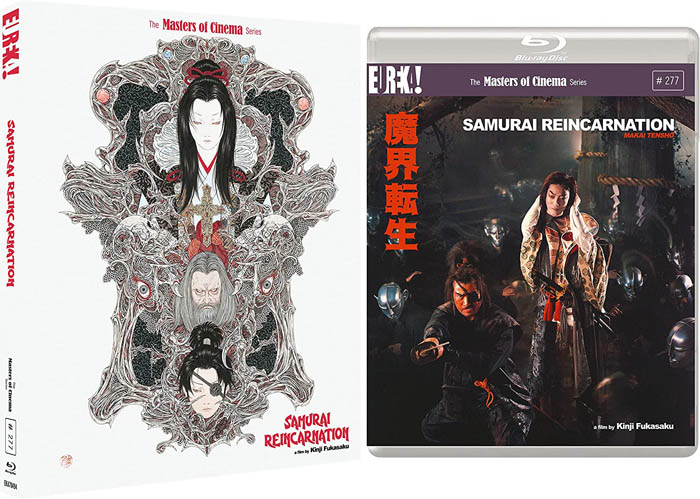
1638. In a battle against the Tokugawa Shogunate army, thirty-seven thousand Christians wind up dead, their severed heads stuck on poles. After a mysterious ritual is performed, the leader of the Christians Shiro Amakusa returns from the dead. More than a bit angry at the brutal slaughter of his people, he renounces God and vows vengeance, but before he sets off to topple Shogun Tokugawa from his position, he must gather a few helpers, offering second chances to tortured, wretched souls whose life has been incomplete or unfinished, turning them into demons who are able to follow their desires as well as help him. Set against this weird bunch are the father and son combo of Tajima and Jubei Yagyu….
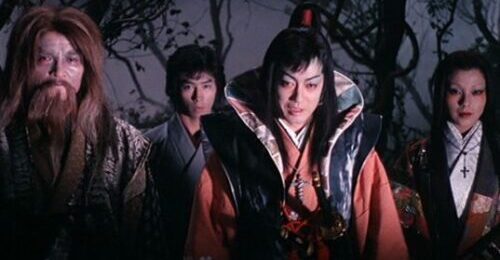
Samurai Reincarnation blends fantasy, swordplay, melodrama and real people and events to enormously entertaining and rather satisfying results. “Real people and events”? you’re probably asking, in a film largely about a supernatural revenge plot carried out by ghost demons [they’re both really so that’s what I’m going to call them even if it seems odd], and which begins with a severed head on a spike suddenly coming to life and flying towards the camera. Well yes actually. The Shimabara Rebellion, where Christians in Japan rebelled against repressive and discriminatory new laws and were killed in huge quantities, and of which we see the aftermath, definitely happened, while a fire did break out in 1657 in the city of Edo which burned it towards the ground including the royal palace; the film offers a semi-fantastical reason for this event. And Shogun Tokugawa Ietsuna, Lady Hosokawa Gracia, Shiro Amakusa, samurai Jubei Yagyu and Myamoto Musashi were all folk who existed, even if the script for this film invents a lot of things for them to be and do, or should that be the book “Makai Tenshu” [Samurai Reincarnation] by Futaro Yamada which was adapted by Tatsuo Nogami and Kinji Fukasaku. But of course it’s easy to forget all this while you’re watching what’s taking place on, Fukasaku [Battles Without Honour And Humanity, Battle Royale] providing a very stylish-looking movie as usual, his firm hand keeping control of a story that only occasionally threatens to lose focus in a few places; the cut, by twenty-four minutes, video release must have been almost incomprehensible. Yet we’re never bored, and the fight scenes are varied in setting and genuinely kinetic, though there’s also much reliance on intrigue and emotion among the characters; fortunately the cast generally come up trumps in a movie which mostly impresses in all departments.
Opening text provides some poetic stuff about a sword before we get a quite simply stunning opening shot worthy of Gothic horror master maestros such as Roger Corman and Mario Bava, with the camera panning around a gruesome tableaux of dead bodies and severed heads on spikes and rocks while purple light illuminates part of the back. Yes, we can tell immediately that it’s a set, but the stylisation is deliberately enhanced to clue us in the fact that there will be fantasy here. In fact the whole beginning scene is incredibly striking despite some of it never really being explained, even though text adds some historical background including the fact that the cut-off heads of Christians were cut in half so that the soldiers could increase their achievements. We’re shown the severed head of Christian leader Shiro Amakusa, then the victors watching a play where a man in a mask seems to be doing some kind of ritual. Wind comes to knock people dead and cause the eyes of Amakusa open – he’s alive! When we cut back to where the play was being performed, everybody seems to be dead except for one man who walks down a path that’s consumed by fog in another image that vintage horror lovers will adore. Clearly hypnotised in some way, he goes over to the head and strokes it before taking his mask off and revealing himself to now be Amakusa, in a great example of how we really don’t always need elaborate special effects at all. Amakusa now rants at a God who’s been of no help whatsoever, and sells his soul to Satan in order to have the power to create death and destruction in retribution both for the massacres and God not stopping it. While this might be rather strange and convoluted logic, his plan works out very well as he’s given powers to take anyone from the brink of death and make them servants of the dark forces but only if they have regrets about not accomplishing some things, and it allows pop icon Kenji Sawada to do some terrific theatrics. However, Amakusa still doesn’t feel that he can overthrow the Shogunate on his own, so he sets out to do some recruiting, meaning that a Magnificent Seven – oh sorry Seven Samurai feel now takes over much of the first half, and who doesn’t love that?
First of all Amakusa resurrects a lady named Hosokawa Gracia, even though she initially doesn’t want to return to what was a rather sad life on this plane of existence, her ghost whirling and gesticulating while Amakusa tries to talk her round in a perfect example of how the often exaggerated performing style that you tend to get in these films can really work. You see, as a flashback shows us, she was married to a samurai who went with other women and was angered by her Christian calmness, and is now eventually persuaded by Amakusa to step into his magic ring to return to her normal self – well, partly. Now we get an interesting transition that really shows how well this film has been constructed for emotional effect, as we cut to a dying samurai full of pain both internal and external while we hear his voiceover describing his feelings. For a few seconds we wonder if this may be Gracia’s husband, but it’s not, it’s another samurai named Miyamoto Musashi. He’s a tortured soul, partly though not entirely because he never met his real match and never got to cross swords with the legendary father-and-son team of Tajima and Jubei Yagyu. He also abandoned a woman. He’s the next one to join up, followed by Buddhist monk Hozoin Inshun, a character who you may not get today considering the way things are. He’s a Buddhist monk who represses his sexual desires, which sounds like no big deal, but actually his desires are to rape and kill women. He’s found and stopped from committing suicide, and soon finds out that as a ghost / demon you can rape and kill women so it’s all good for him! And finally there’s young Iga ninja Kirimaru, who’s narrowly saved by Shiro and his demons after his village is massacred by the rival Tokugawa-controlled Koga ninja clan. Kirimaru is resurrected and recruited by Shiro for vengeance against the Koga. They soon set about toppling the Tokugawas, either by force or more subtle methods such as Hosokawa taking the form of a woman who went mad and seducing Shogun Tokugawa Ietsuna, keeping him busy in bed so that he neglects his duties.
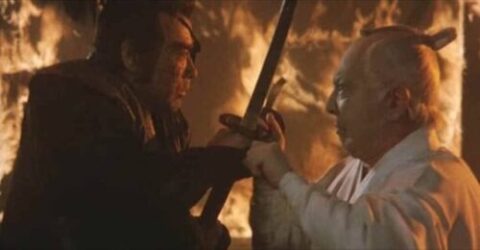
Set against these deliberatly chosen ghost / demons are the Yagyus, but Tajima is terminally ill if still powerful. Then there’s swordsmith Muramasa who lives with a woman named Otsu who’s -well, I’m not going to say! The fights don’t really get into high gear in the final third, but we’re so involved in the intrigues of the various characters, none of whom are drawn in black and white, that we don’t mind even if the tale sometimes seems to be on the verge of losing itself. Especially interesting is Kirimaru, who becomes attracted to a girl[who initially looks about twelve but I’m sure that wasn’t intended to be much of a deal]. “if you like her, rape her, then you’ll be a fully fledged demon” says Amakusa, but Kiramaru seems to be fighting against his demonic instincts. While understandably not given that much time given that these are minor characters in the great scheme of things,t his subplot is well handled until the daft moment where she quickly agrees to run away with him even though in their previous scene he tried to rape her before changing his mind. Frequent readers of my reviews will know that I’m not particularly PC, but the attitude to sexual violence displayed in some of these movies can’t help but cause a bad taste in the mouth. In contrast to that, there are memorable bits involving the playing of a flute by one of the female characters which create some calmness, at the very least some balance between the characters. There are several twists – I feel that I’ve done quite well in not giving too much away even though I’d love to go into certain plot turns because I was really caught up in some of the situations. I genuinely feel that a lot of folk who aren’t experienced in movies like this will really get into this particular film. The duels consist of a lot of build up followed by brief battling and a death, but the staging is very impressive, the two climactic ones taking place on a very picturesque beach and in a burning building where the actors are quite clearly surrounded by fire.
Of course with the likes of Chiba [who also played Jubei on three other occasions], Tatsokoshi Akiyama and Lone Wolf himself Tomisaburo Yakayama you know that the swordplay is going to be first class, but it’s really only a small ingredient in the bigger picture as Fukasaku and Nogami keep on with their form of revisionist fantasy history, and doing it very well. These ghosts demons, realised by minimal use of special effects [for example their eyes become green cat’s eyes when showing some of their true selves], follow their desires but are also able to cause earthquakes to happen and crops to wither, sparking protests by farmers against the Shogunate’s taxes. There’s a real urgency in the final section even if you know that things didn’t go quite the way that the film depicts. But hey – Hollywood did this innumerable times. Also surprisingly successful is that we’re not always sure who to root for. Yes, Jubei and Tajima may be our heroes, but they’re defending an often cruel regime that treated members of a particular religion extremely badly and came to virtually exterminate them, while their demon ghost opponents are all characters that we have sympathy for, except for maybe one who’s probably obvious. Of course any political commentary is simplistic, with rich people hunting people like deer, though we’re told on the audio commentary that the student riots were one of the inspirations for the original book. There’s certainly a lot of visual stylisation, from black and white flashbacks to slow motion to freeze frames to shots which look like they’ve come from an older film which covered the early adventures of one character. Certain examples are really impressive, for example a shot photographed through several stainless glass windows; kudos for cinematographer Hozan Yamamoto. Hozan Yamamoto scores the movie in a psychedelic rock manner which actually goes well with the images, though the flute music played by not one but two female characters provides a haunting background, as does also a song from one of them.
Sometimes Samurai Reincarnation feels constrained by its running time; it could have easily worked as a four-hour epic. But it still sets its sights quite high and manages to just about pull off what it tries to achieve. It’s a really fascinating and fulfilling watch.
SPECIAL FEATURES
Limited Edition slipcase featuring artwork by Takato Yamamato [2000 copies]
1080p presentation on Blu-ray from a 2K restoration of the original film elements
This restoration does extremely well by a film which, despite its terrific use of colour, has a lot taking place in dark settings. The blacks exhibit hardly any crush and it’s still possible to make out a lot of detail.
Uncompressed original Japanese mono audio
Alternate English dubbed audio
I tried a few minutes of this. The voice actors aren’t always well chosen and don’t even seem to be acting much. As regular readers will know, I have no problem with the concept of English dubs and often play them, but here, my advise would be to stick with the Japanese audio track.
Optional English subtitles
Brand new audio commentary by Tom Mes
Mes provides his usual slow, laid-back talk track [what a contrast to, say, Frank Djeng!] here, perhaps not one to listen to if you’re tired despite the huge amount of information that he gives us, especially in terms of historical background. Hosokawa Gracia, for example, was one of a number of family members of lords who were taken hostage and threatened with death by the Shogun to the lords will join him in fighting rebels, while an island duel like the one depicted did take place but with one of the opponents being different. The interweaving of truth and fiction really is fascinating. A male kiss was thought up on the spot by Fukusaka, who, having just had a commercial failure, wouldn’t have even made this if the originally intended director hadn’t been arrested for carrying a firearm.
Brand new interview with filmmaker Kenta Fukasaku [26 mis]
Kinju’s son, who by the way was the little boy in The Challenge, mentions a few of the same things that Mes did, but this almost stops after just a short while. He provides some nice stuff about his father, whom he says never wanted to adapt a book faithfully and altered a lot of Makai Tenshu with Amakusa’s role being greatly enlarged and two of the characters being new. Kinju, who would often playithe harmonica when drunk, was often busy on film sets, when Kenta was young, so Kenta spent much time with Chiba and his Japan Action Club. He ends up covering a lot here, his thoughts at times rather random as he tries to cram in all that he can and recollections keep coming back to him.
Original Japanese trailer
A collectors booklet featuring new writing on the film
Eureka provide a fine disc for this rather unique but easy to get into samurai picture which really deserves to have a very strong cult following indeed. Highly Recommended!





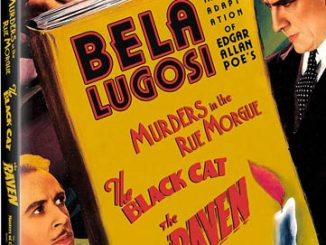
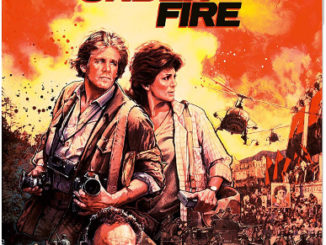
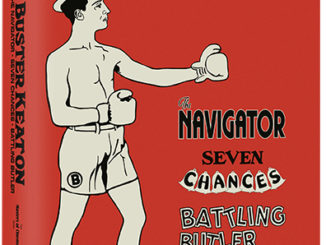
Be the first to comment